- Home
- David Liss
Randoms Page 12
Randoms Read online
Page 12
“It’s not exactly a war,” said Dr. Roop. “It is more like an ideological disagreement—with weapons.”
“The Confederation and the Phandic Empire have been clashing for centuries,” the captain said. “Usually the conflicts take place in peripheral locations, and things rarely escalate to violence.”
“Let me guess,” I said, my stomach twisting as I spoke. This conflict sounded suddenly familiar to me, and I knew where I had heard of it before. “The Confederation and the Phands fight primarily over access to Former artifacts.”
All the aliens were now staring at me. “How did you know that?” Urch asked.
“Because this whole thing is like Colony Alpha, that’s how.”
“Give the stupid TV shows a rest,” Mi Sun said.
I didn’t respond in the way she deserved. I didn’t tell her that Colony Alpha was not stupid. Some of the elements were spot on. It was my father’s show, even if he had stumbled upon these truths by blind luck. In that story, a lone human colony found itself in the middle of a war between benevolent aliens, who were clearly losing, and evil, imperial aliens, who were on the cusp of victory. In order to survive, the humans had to side with the bad guys, and the show asked a lot of tough moral questions—or at least it was supposed to before the rewrites.
“The Confederation and the Phandic Empire have learned to live with each other,” Dr. Roop explained. “Conflicts arise, but usually they are resolved quickly and without much bloodshed. Unfortunately, the attack today is part of a recent pattern of Phandic escalation.”
“And some are already afraid that Mr. Reynolds’s destruction of the Phandic vessel will further antagonize them,” the captain said.
“Next time,” Urch said to me, “you should show them how nice you are by letting them destroy you.”
“We do have treaties dictating the rules of engagement,” the captain said, raising her voice slightly, “but in my view, as Mr. Reynolds was unaware of them, and because his world was not a signatory to them, he is not bound by them. The Phands will not see it that way, but the councils will have to.”
Ms. Price sighed. “Look, this may be uncomfortable, but I’m here to represent the best interests of my world. I’m not here to make friends.”
Snarky-retort restraint. Check.
She turned to me. “Zeke, you’re a nice guy. We all like you, and I suppose it’s possible we are alive because of you, but you’ve become a liability to this mission, to Earth’s chances of joining the Confederation, and very possibly to the Confederation itself. I think it would be in everyone’s best interest if you were to resign from the delegation. I know that’s not the way things are usually done, but surely under the circumstances we can make an exception.”
“Thank you for sharing your opinion, Ms. Price,” the captain said. “However, we have already made it clear that what you suggest is not an option. Dr. Roop tells me you made such inquiries before you left Earth.”
“That was before this happened,” Ms. Price said.
“The situation remains the same. We cannot alter the delegation without the approval of the selection committee, and that august body currently does not exist. My orders are to tunnel to Confederation Central at our best speed. We’re not returning Zeke to Earth. This meeting is not to determine a course of action; it is simply to inform you of the circumstances.”
“I see,” said Ms. Price.
“And it relieves me to learn that you are not trying to make friends,” the captain said, locking her hammerhead eyes on Ms. Price, “because no one likes you.”
• • •
Outside the conference room, Ms. Price and the other humans hurried out. I guess after having tried to throw me under the space bus, they didn’t want to stick around for the small talk. The captain gave me a sympathetic pat on the shoulder and then headed for the bridge. I stood there with Urch and Dr. Roop.
“This situation stinks of vomit,” Urch said.
“It does,” Dr. Roop agreed.
“Am I in trouble?” I asked. “I didn’t want to kill anyone on that ship.”
“I understand,” Dr. Roop said. “But unfortunately, there are people who are going to use the incident to gain power. The captain will support you, and so will I. And I will speak to the members of your delegation. They need to support you as well. In public at least.”
“Thanks,” I said.
He began to walk away, but then turned back. “What are you now, really? Level nine?”
“Eleven,” I said.
His eyes grew wide. “That is impressive,” he said. “No one has ever reached eleven before arriving at the station before. But maybe you should hold off on letting the others know how far you’ve advanced. You don’t want to make yourself conspicuous.”
Urch hissed his menacing laughter, and I understood the humor all too well. It was a bit late for that.
• • •
I had only just returned to my bunk, and was sitting on the bed, staring at the wall, when there was a knock on my door. Spaceship quarters did not appear to have doorbells. I opened it and saw Captain Qwlessl standing outside.
“May I come in?”
I stood aside to let her in and she closed the door behind her. Her huge form seemed silly in my cabin, but she appeared unselfconscious. She lowered herself onto my single chair, and I sat on the bed. When I looked up at her, I saw the dim number above her head was now 44.
I gestured toward her number. “Congratulations.”
She waggled her trunk. “At my age leveling is less significant than it used to be. And the new level comes at too high a price.”
“I suppose it does,” I agreed.
“I wanted to talk to you more about what happened today.”
“Are you angry with me?”
“For saving my ship and the crew?” she asked. “Hardly. But you are now caught up in a political mess, so there are things you ought to know—things I could not say in that meeting.”
“Who are the Phands?” I asked, before she could say anything I didn’t want to hear. “Why did they kill those Ganari?”
She moved her trunk in little circles as she spoke. “Like the Confederation, their empire consists of many worlds and contains many species, but the highest levels of government are open only to one species, the Phands. They have reached out to the stars and explored, expanded, exploited, and, I fear, exterminated.”
I’ve enjoyed my share of 4X games, but I thought it best not to bring that up just now.
“Like the beings of the Confederation, the Phands have built on, and expanded upon, Former technology and designs, though they have put their creative endeavors into developing weaponry, while we have concentrated on shielding and sensors. It is our first priority in any engagement that one of our ships must never fall into enemy hands, just as they have similar orders. If we could duplicate their weapons or if they could understand our sensors and shielding, one side would dominate the other in a matter of weeks. We would liberate their conquered worlds, or they would exterminate us and take Confederation Central for themselves. It is the most sophisticated functioning example of Former tech known to exist, and they would do anything to possess it.”
“But they cracked your shielding,” I said. “Does that mean the Confederation is in serious trouble?”
“No,” she said. “This happens once or twice a decade. We improve and they improve. The data from that attack will be analyzed closely, and adjustments will be made to all shielding. It was a temporary advantage and won’t change much.”
“If this were a one-time advantage, wouldn’t they save it for a more important battle?”
“That is a very good question,” she said. “Maybe they thought we wouldn’t survive and be able to transmit our data to the Confederation, but that isn’t a satisfying answer. The truth is, all evidence points to this having
been a top-priority mission for them.”
Great. Killing us was the top of their list.
“Zeke,” the captain said, her voice now unmistakably serious, “they had us. In another few minutes they would have lanced the Dependable. I could never willingly let them capture a Confederation ship. If it had been in my power, I would have destroyed this vessel first, but there weren’t enough of the bridge crew conscious to activate the destruct mechanism. So you must understand that at the very least you saved our lives, but you may have also saved the entire Confederation.”
I stared at her. I didn’t feel like a hero, and I didn’t particularly want to be told I was one, but I did relish her point: that I had not done anything wrong.
“I just didn’t want us to get killed,” I said.
“I know that, Zeke. The fact that we almost lost the war can’t become public knowledge, but it was important to me that you hear it. The appropriate councils will know the truth, I know the truth, and though he lacks the clearance, I told Klhkkkloplkkkuiv. Dr. Roop.”
There was something about how she said his name. “Are you two . . . ?” I waved my hand in the air.
“Why?” she asked. “Do you think he’s too young for me?”
“I think he’s kind of tall for you.”
She laughed. “I like tall beings.” Then, more seriously, “I trust him, and you should too. I don’t know that you can trust anyone else, so please be careful when you get to the station.”
I bit back my fear and my sadness, because there was something else I had to know. I didn’t want to know, and I could have just tried to forget it, but I somehow knew the answer would catch up to me, and I’d rather hear it when I was braced than have it take me by surprise.
“How many?” I asked. “How many were on that ship?”
“I can’t say for certain,” she said, her voice filled with genuine sadness, though I did not know if it was for the Phands or for me. “A [stone fist]-class Phandic saucer has a standard complement of thirty to thirty-five.”
I nodded. I had killed between thirty and thirty-five beings. Now I knew.
“Did you want to kill them?” she asked. “Do their deaths give you pleasure?”
I shook my head. “No,” I whispered in case my gesture did not translate. “But I didn’t follow the rules, did I? If Urch had done what I did, would he be in trouble?”
“He is a trained officer,” she said. “He is bound by the regulations. I chose to put you at that weapons console, and if anyone is going to answer for what happened today, it will be me.”
“I can’t ask you to do that,” I said.
“It’s not about doing you a favor. It is the truth. I had no choice but to do what I did, and I don’t regret it. Neither should you. Learn from what happened, but don’t condemn yourself for doing the best you could.”
She stood up now, and when I stood, she put a hand on my shoulder. “I had a son, Zeke, in the exploration services. He was lost while investigating a possible Former outpost. We think it was a Phandic raid, but we couldn’t be certain.”
I had imagined more than a hint of sadness in those huge and widely spaced eyes. Now I knew why. “I’m sorry,” I told her. There was nothing else to say. I knew a thing or two about loss, and I hoped that would come across.
“Forgive me if I’m mothering you a little. You remind me of him. You don’t exactly look like him, but there’s something there.” She wrapped her thick arms around me and took me into a massive hug. Her body was hard—it was like hugging a piece of furniture—but her touch was gentle, and she smelled like leather and cinnamon.
When she let me go, she said, “I hope you don’t mind.”
“I don’t mind at all,” I said, feeling a little teary. The captain’s affection made me think about my mother, and how she must be suffering now, not knowing what was happening to me, dealing with the fact that she would not hear from me for a year.
“I have a lot to attend to, but if you need anything, message me.”
I nodded.
She opened my door and stepped out into the hall. “‘Fortune favors the bold,’” she said. “For your sake, I hope you’re right. For the Confederation’s, I pray you’re wrong.”
• • •
I awoke just before six in the morning, ship’s time, to the now-recognizable lurching sensation of emerging from a tunnel. As soon as we returned to regular space, my viewscreen reappeared on the wall, composing itself out of what had looked like ordinary plastic seconds before. I sat up quickly and got my first look at the capital of the Confederation.
The station orbited a gas giant, much like Saturn with its rings and multiple moons—I counted five currently visible, which meant there were likely more on the far side. The planet was stunning: a mix of deep blues and brilliant reds and ominous grays swirled in clouds of mysterious gases. It was unspeakably beautiful, and the only thing that could have made me look away was the station itself.
It was a massive disk, silver and glowing with lights; on the top a clear dome arose over more than three quarters of the surface. Though we were at a great distance, I could see buildings inside the dome, whole neighborhoods separated by a complex rail system or huge clumps of vegetation and artificial bodies of water. Above it all hovered actual cloud formations. On the fringes were huge patches of what looked like forests, mountains, and deserts. I was expecting Babylon 5 or Deep Space Nine, but this was something else entirely—this was a continent in space, and at its center a massive city.
As we drew closer, I was struck by the sight of the ships in orbit, several of them significantly larger than the Dependable. Urch had been right about that. The size and design of them left no doubt that these were battleships, and they appeared far more suited to take on one of those monstrous Phandic flying saucers than we had been.
Many of the ships were blackened and scarred and broken, like they had seen combat. The ugly welts and scars and burns implied they’d been the losers. Maybe the fact that the ships had survived spoke to their success, and maybe they’d come to the station for repairs, but looking at that collection of blasted and hobbled vessels made me worry that I’d antagonized the winning side in a nasty war.
Only after I’d spent more than an hour staring out the window did I notice that there was a message waiting for me on my data bracelet. I opened up the communications queue and then tagged the only thing in my inbox. It displayed about a foot and a half before my eyes in blue letters against a white holographic projection.
The rest of the delegation does not want me to speak to you, and I understand, and agree with, their reasons. Nevertheless, you saved our lives, and it would be wrong not to thank you for your courage. I will forever be grateful, but please don’t indicate we’ve been in contact in front of the others.
Nayana Gehlawat
It was a good thing she’d signed off with her last name. Otherwise I’d have had no idea which Nayana had sent this.
I snorted a laugh as I thought about what a lame thank-you it was. I also thought that, compared to the other humans traveling with me, she was a real class act.
• • •
Dr. Roop contacted me through my data bracelet to tell me to pack my bag and report to the shuttle bay in half an hour. When I arrived, the other humans were already there. The captain and some of the crew, including Urch and Ystip, had also arrived to see us off.
Urch jutted out his jaw and showed me his teeth. “Show no mercy to your enemies.”
“I’ll feast on their bowels,” I told him. “Metaphorically.”
“Probably best that way.”
The captain wrapped her arms around me, gave me a hug, and then pressed the tip of her trunk to my cheek. “Be careful,” she said. And then, perhaps thinking she didn’t want to freak me out too much, “I know you will do well.”
“Will I see you again?” I a
sked.
“I come by the station three or four times a year. I promise to visit next time I’m here.”
We then climbed onto the shuttle and headed over to Confederation Central to begin our careers as initiates. Crazy as it seemed, we had not yet even started.
Part Two
LET THE WOOKIEE WIN
* * *
CHAPTER ELEVEN
* * *
The public knows about you,” Dr. Roop told me on the shuttle to the station, “and you may get some attention from data collectors from various news outputs. I arranged that they wouldn’t find out when we’re getting in, so they won’t swarm you right away. Just be ready in case word has leaked.”
I nodded, guessing that “data collectors” were something like reporters. If so, I hoped he had been as good at deceiving the media as he thought, since having to explain myself to the entire Confederation was just about the last thing I wanted to do.
We sat in anticipatory silence. Once or twice I thought Nayana was looking at me, but when I checked, she was turning away. Did I even want her to be my friend? The warmest and most human thing she had ever done was secretly thank me for saving her, but she couldn’t bring herself to speak to me in public. Maybe Nayana was merely spoiled and confused. Maybe she would come around. Waiting for that to happen, however, seemed pathetic, though maybe less pathetic than spending the next year on a space station without friends.
The shuttle had landed in something like an airport, and we took a sleek, eel-shaped commuter train to reach some kind of hub, and then another train to another hub, and then one last train. I braced myself for reporters with intergalactic notepads to come running up to us, shouting out questions, but whatever it was that Dr. Roop had done to fool the media, it had worked. No one paid us any attention. We must have looked strange to the locals, but I soon realized that unusual appearances were the norm on Confederation Central. The station was full of a huge variety of beings: some species that I had already seen, but many more that were entirely new, and many unlike anything I had ever imagined—quadrupeds and hexapeds and octopeds. There were beings ten feet tall, and some that came up only to my knees. There were beings that looked like gas clouds or huddled blobs of flowing water. Yet, for all the variety, the majority were bipeds, about human height, who looked like animals or combinations of animals I knew. We made our way through all this, receiving hardly a second glance from most of the beings we saw.

 The Whiskey Rebels
The Whiskey Rebels Renegades
Renegades The Twelfth Enchantment: A Novel
The Twelfth Enchantment: A Novel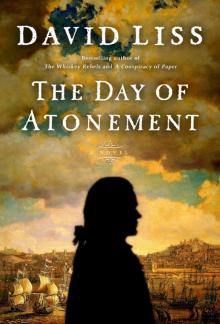 The Day of Atonement
The Day of Atonement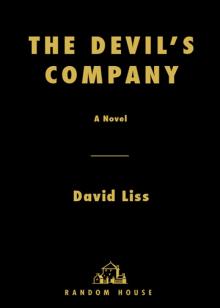 The Devil's Company
The Devil's Company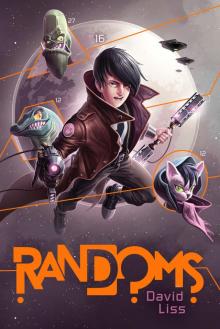 Randoms
Randoms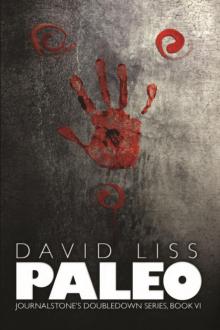 Paleo / The Doomsday Prepper
Paleo / The Doomsday Prepper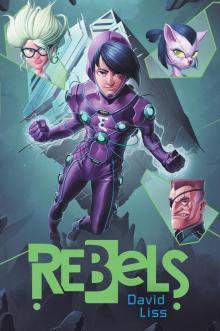 Rebels
Rebels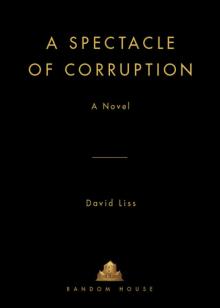 A Spectacle of Corruption
A Spectacle of Corruption The Twelfth Enchantment
The Twelfth Enchantment The Coffee Trader
The Coffee Trader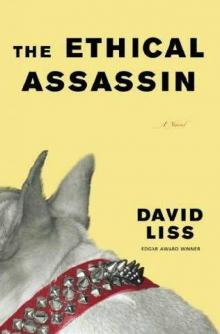 The Ethical Assassin
The Ethical Assassin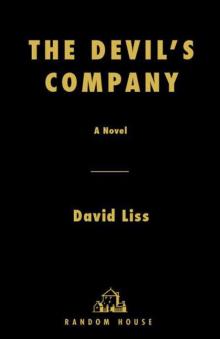 The Devil’s Company: A Novel
The Devil’s Company: A Novel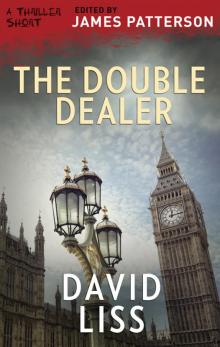 The Double Dealer
The Double Dealer The Whiskey Rebel
The Whiskey Rebel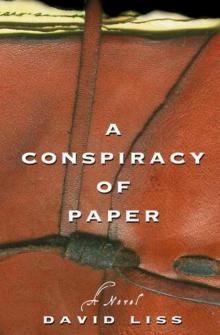 A Conspiracy of Paper bw-1
A Conspiracy of Paper bw-1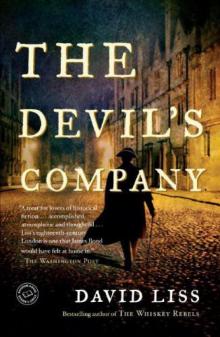 The Devil's Company bw-3
The Devil's Company bw-3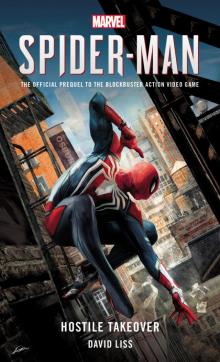 Marvel's SPIDER-MAN
Marvel's SPIDER-MAN